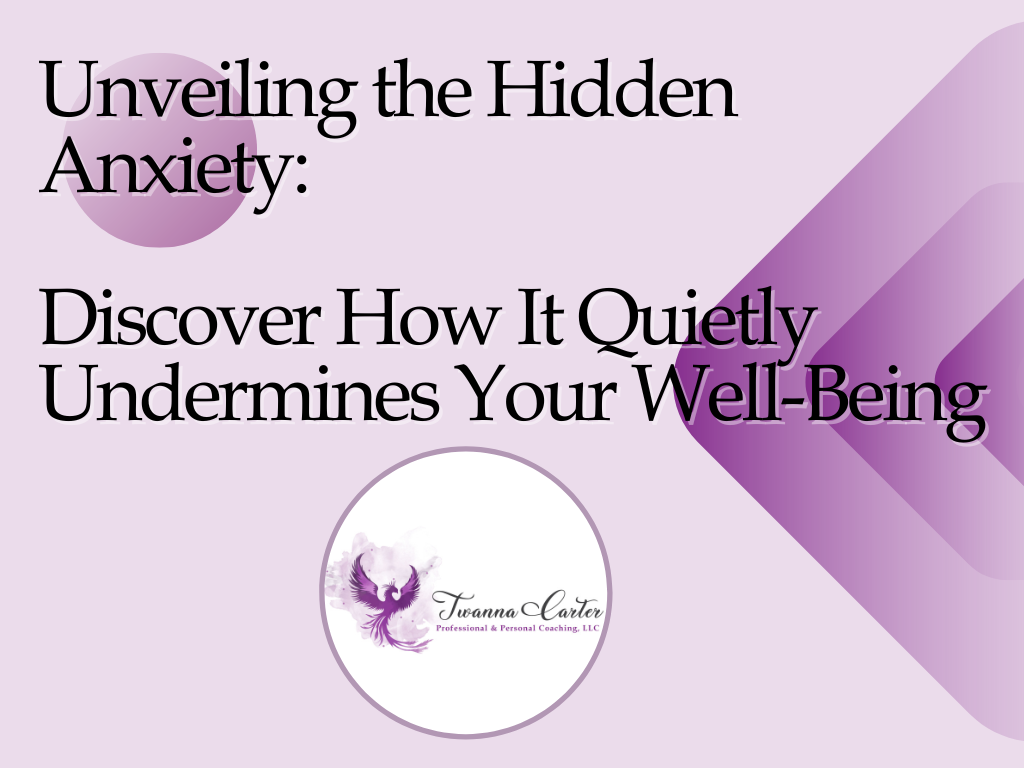June 21, 2021
Discover How It Quietly Undermines Your Well-Being
Table of Contents
Toggle
The concept of high functioning anxiety might not be familiar to everyone.
Anxiety stands out as one of the most prevalent mental disorders. Globally, more than 284 million individuals experience anxiety, with women constituting over 60% of those affected. High functioning anxiety constitutes a subgroup. What I find particularly intriguing is that a significant number of women remain unaware of its presence in their lives!
This is precisely why it’s often referred to as the secret anxiety. Accomplished women excelling in their respective fields, whether as CEOs, nurses, physicians, educators, or entrepreneurs, could potentially be grappling with high functioning anxiety, all while being oblivious to this fact.
From an external view, these women exhibit remarkable composure in various aspects of their lives – their careers, families, and relationships. They often serve as exemplars of achievement. We want to be them! One might wonder, given their high levels of accomplishment, where lies the concern? The predicament arises from the fact that these women suppress the entirety of the anxious symptoms they encounter, and this has harmful effects.
To gain a better understanding
Let’s retrace our steps and delve into the realm of anxiety. It is an entirely natural function, a facet of our being that safeguards us. In truth, it embodies a safeguarding emotion. Anxiety’s primary purpose involves shielding us from harm and jeopardy. Imagine for a moment you’re enjoying a quiet stroll, when suddenly, the intense barking of a dog erupts nearby. That very sound serves as a catalyst for your fight-or-flight reflex. Anxiety assumes a pivotal role within your body’s survival machinery. Your system seamlessly enacts the necessary measures for survival. In this instance, contingent on the circumstances, you might find yourself more alert, ready to retreat, or preparing to confront the potential threat.
Anxiety undoubtedly finds its rationale in such scenarios. Yet, there exist other stressors within our lives that can provoke a sufficient level of anxiety to activate our survival mechanism. Things like interviewing for job, speaking in public, multiple tight deadlines, fear of failure, and the fear of success. Admittedly, they don’t really indicate life or death situations, but our bodies can experience them as such and set off our survival mechanism. .
For many people with anxiety these stressors can cause symptoms such as
- Excessive worry or feeling on edge
- Restlessness or feeling keyed up or on edge
- Fatigue or feeling easily tired
- Difficulty concentrating or finding your mind going blank
- Irritability or easily getting frustrated
- Muscle tension or aches
- Difficulty falling asleep, staying asleep, or having restless sleep
- Feeling overwhelmed or a sense of impending doom
- Racing or pounding heartbeat
- Shortness of breath or feeling like you can’t catch your breath
- Sweating excessively or having cold, clammy hands
- Trembling or shaking
- Nausea, stomachache, or indigestion
- Dizziness or lightheadedness
- Chest pain or tightness in the chest
- Feeling detached from reality or like things are unreal or unfamiliar
- Feeling like you’re going to lose control or go crazy
- Avoiding certain situations or places due to fear or anxiety
- Frequent need to urinate or having diarrhea
- Feeling easily startled or jumpy
It’s Important to Know
Because these symptoms can disrupt your life by negatively affecting job performance, increased stress in relationships, days lost from work, and increased stress response.
But professional women with high functioning anxiety don’t have an outwardly manifestation of these symptoms.
High achieving women with high functioning anxiety are really great at concealing and pushing down all the symptoms and emotions. They have become adept at hiding that anxiety. Your anxiety is functional and doesn’t outwardly affect your performance. And you may expend a lot of energy hiding your true feelings. As a result, you may have problems being authentic in relationships, both professionally and personally. Because you are pushing emotions down, sometimes people sense that youre hiding something.
For example, an entrepreneur whose business is running like a well-oiled machine. In the workplace, shes responsible, accomplished, and very successful.
Here’s another secret
Women with high functioning anxiety are not okay on the inside. What you see outwardly is that they have it together. They have the career. They have a family. They’ve got relationships. They make time for volunteer activities. You may see them because they run, they swim, and they compete in marathons. Some play tennis. Others excel at playing golf. They seemingly do it all with style and grace. However, on the inside the signs are of anxiety are hidden so deeply you don’t see them from the outside.
What are other symptoms of high functioning anxiety these women may have? Positive traits on the surface include…
- very detail oriented
- calm and emotionally controlled on the outside
- very open and people oriented
- very talkative
- Timely and organized
These traits are useful and come in handy in the workplace. However, being extremely detail oriented is a way you’re trying to manage anxiety by trying to control for all possibilities. Afraid of making a mistake or being seen as failure is something many women with high functioning anxiety face. And even trying to be the perfect team player.
Calmness is an illusion gained by expending so much energy trying to push down and hide anxiety. Much like appearing open and people oriented can be a way to hide emotions such as dread and fear you may feel ashamed of. Not wanting people to see how emotional you are beneath the surface. And being late increases anxiety and feelings of not being in control or not being perfect. So, you are typically on time. Maybe even a little extreme about it.
The negative symptoms include…
- Overthinking: People with high-functioning anxiety tend to overthink everything, which can lead to feelings of worry, stress, and fatigue. They may constantly worry about the future, ruminate on past mistakes, or second-guess their decisions.
- Nausea: Anxiety can cause nausea, stomachache, or other digestive problems. This is because anxiety can trigger the release of stress hormones, which can upset the digestive system.
- Inability to relax: People with high-functioning anxiety often find it difficult to relax. They may feel restless or on edge, even when they are not doing anything stressful. This can make it difficult to sleep, enjoy hobbies, or spend time with loved ones.
- Perfectionism: People with high-functioning anxiety often set unrealistic expectations for themselves. They may strive for perfection in everything they do, which can lead to stress, frustration, and disappointment.
- Difficulty sleeping: High functioning anxiety can make it difficult to fall asleep and stay asleep. This is because anxiety can increase heart rate and blood pressure, making it harder to relax.
It may also include…
- Negative self-talk: People with high-functioning anxiety often have negative thoughts about themselves. They may criticize themselves for their mistakes, dwell on their flaws, or worry about not being good enough.
- Self-medicating with alcohol or drugs: Some people with high-functioning anxiety self-medicate with alcohol or drugs to try to cope with their symptoms. However, this can actually worsen anxiety in the long run.
- Digestive issues: Anxiety can cause a variety of digestive problems, such as nausea, stomachache, diarrhea, or constipation. This is because anxiety can trigger the release of stress hormones, which can upset the digestive system.
However, it is important to remember that everyone experiences anxiety differently. The symptoms listed above are just some of the most common negative symptoms of high-functioning anxiety. If you are concerned that you or someone you know may have high-functioning anxiety, it is important to seek professional help. Consequently, that’s why I offer anxiety and how my clients how to develop coping strategies.
How do you fix high-functioning anxiety? Here are my tips for coping with high functioning anxiety:
- Get regular exercise. Exercise is a great way to reduce stress and improve mood. Therefore, aim for at least 30 minutes of moderate-intensity exercise most days of the week.
- Practice relaxation techniques. There are many different relaxation techniques that can help reduce anxiety, such as deep breathing, meditation, and yoga. Find a technique that works for you and practice it regularly.
- Get enough sleep. When you’re well-rested, you’re better able to cope with stress. Aim for 7-8 hours of sleep each night.
- Use grounding exercises. This fairly simple in groups of 3. For example, you can count 3 things you hear; then count 3 things you see; and finally name 3 things you are touching.
- Eat a healthy diet. Eating a healthy diet can help improve your overall mood and energy levels. Avoid sugary drinks and processed foods, and focus on eating plenty of fruits, vegetables, and whole grains.
- Learn to say no. Don’t be afraid to say no to requests that you don’t have time for or that will add to your stress. It’s important to take care of yourself first.
- Build a support network. Talk to friends, family, or a therapist about how you’re feeling. Having people you can trust to talk to can make a big difference in managing anxiety.
Conclusion
If you are dealing with high-functioning anxiety please know that you are not alone. I been there before. And you can win the battle by following these anxiety tips. And investing a coach who understands your journey with knows how to coach women coping with high-functioning anxiety.
If you know of a working professional woman who may be dealing with high functioning anxiety and would find this helpful, be sure to share this article with her!

Dr. Twanna Carter works with high achieving women over 40, who often feel the pressure of the corporate grind – and hit a mid-life crisis. This is particularly true for professionals who are looking to shift careers and change what they do or leave the workforce. Part of the problem is that theres no roadmap to navigating this change and building a new career. I work with women to help them successfully navigate this new career journey.
You can read about my personal journey with social anxiety here.
Lastly, if you want to dive in deeper. Then check out my Youtube video about the 10 Unmistakable Signs of High Functioning Anxiety. Just click the link below to watch it.
Recommended Books
- Melaninated Magic: 180 Affirmations to Nurture Your Soul and Unleash Your Black Girl Joy by Twanna Carter, PhD
- I’m Not Yelling: A Black Woman’s Guide to Navigating the Workplace (Successful Black Business Women), Elizabeth Leiba
- Stop Overthinking: 23 Techniques to Relieve Stress, Stop Negative Spirals, Declutter Your Mind, and Focus on the Present (The Path to Calm) by Nick Trenton
- Influence: The Psychology of Persuasion by Robert B. Cialdini
- How to Win Friends and Influence People by Dale Carnegie
- High-Functioning Anxiety: A 5-Step Guide to Calming the Inner Panic and Thriving by Dr. Lalitaa Suglani
- Dare to Lead by Brene Brown
- The Memo, by Minda Harts
- Atomic Habits: An Easy & Proven Way to Build Good Habits & Break Bad Ones, by James Clear
- Worthy: How to Believe You Are Enough and Transform Your Life, by Jamie Kern Lima
+ show Comments
- Hide Comments
add a comment